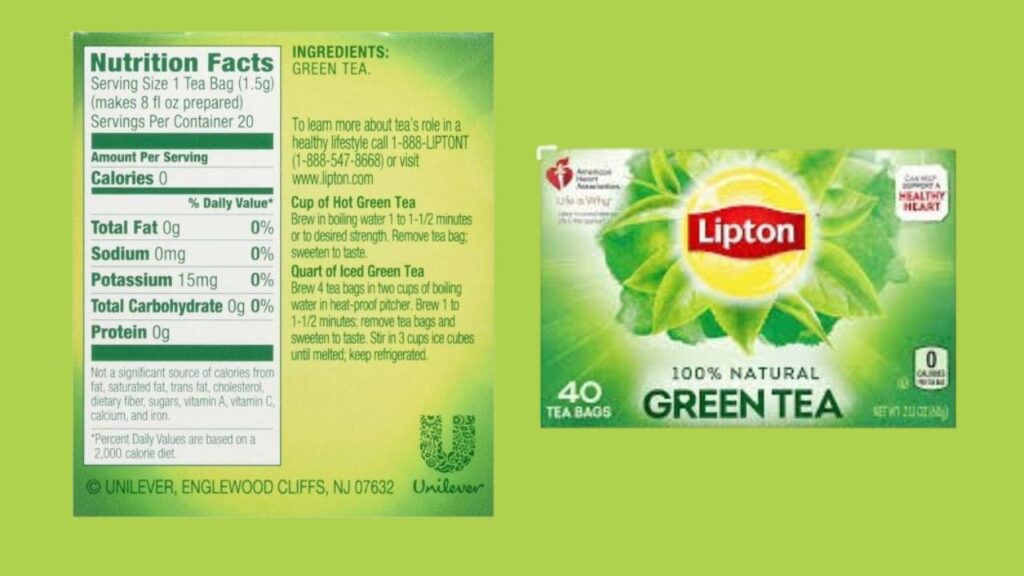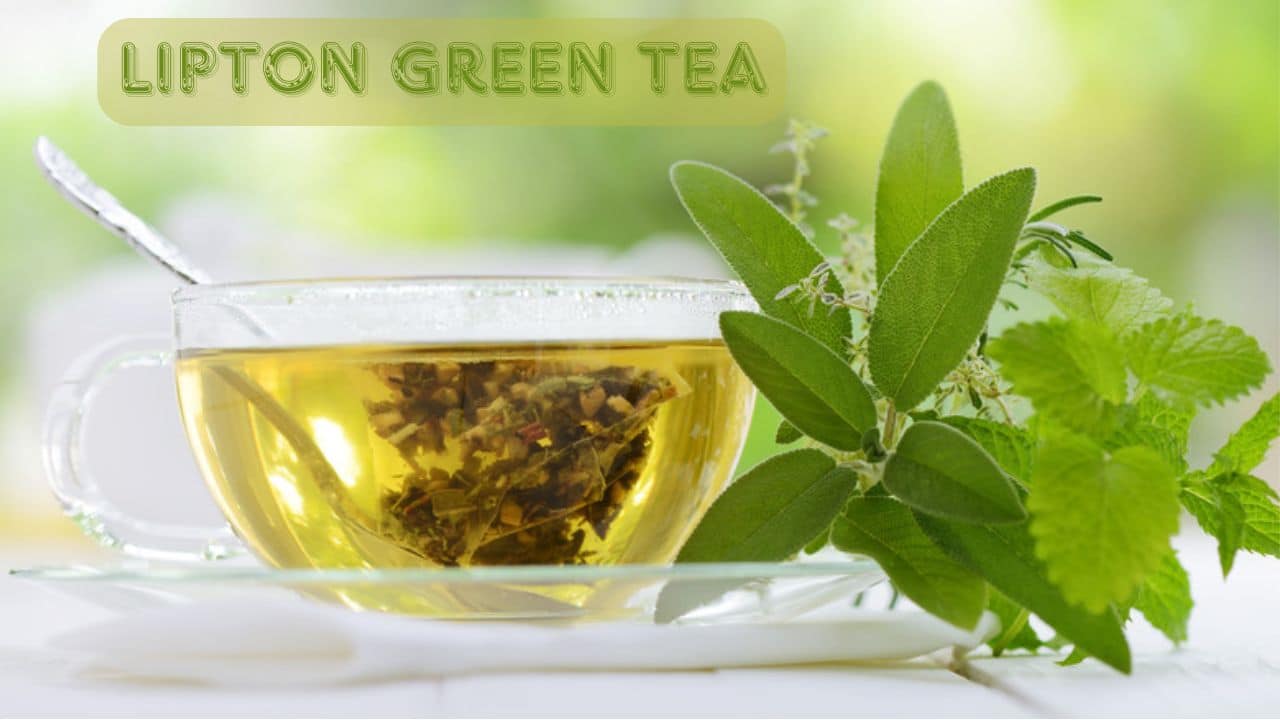Written By: Sherry Harris
Green tea is often hailed as a healthful alternative to other caffeinated drinks, but does lipton green tea have caffeine? As a staple in households worldwide, many wonder about its caffeine content. Let’s dive into the details and explore whether this popular beverage is a suitable choice for everyone.
Table of Contents
What is Lipton Green Tea?
Lipton Green Tea is one of the most popular products from the iconic Lipton brand, known worldwide for its variety of teas. It combines the natural goodness of green tea leaves with the convenience of tea bags, making it accessible to a wide audience. Lipton’s green tea options are crafted to deliver health benefits like antioxidants while maintaining a refreshing taste. This section introduces the brand and its commitment to quality and innovation in tea products.
The Lipton brand was established in the late 1800s by Sir Thomas Lipton, who aimed to make tea an affordable luxury for everyone. Over the years, the brand has gained global recognition for its consistent quality and innovative tea blends. Lipton Green Tea reflects this legacy by offering a balance of affordability and premium quality.
Does Lipton Green Tea Contain Caffeine?
Yes, Lipton Green Tea contains caffeine, though the amount is moderate compared to coffee or black tea. Regular Lipton Green Tea has approximately 28–38 milligrams of caffeine per 8-ounce serving, making it ideal for mild energy boosts. For those sensitive to caffeine, Lipton also offers decaffeinated options. This section provides a detailed answer to the central question while addressing consumer preferences.
Regular Lipton Green Tea contains a moderate amount of caffeine, providing a mild energy boost without the intensity of coffee. The caffeine level may vary slightly based on brewing conditions like steeping time and water temperature. This amount suits individuals who want gentle stimulation throughout the day. This subsection highlights the caffeine content and its appeal for different consumers.
Key Ingredients of Lipton Green Tea
The key ingredients of Lipton Green Tea ensure a healthful and refreshing tea-drinking experience. Each ingredient contributes to the tea’s flavor, aroma, and nutritional value:
- Green Tea Leaves: The primary ingredient, green tea leaves, are carefully selected for their high antioxidant content and smooth flavor. These leaves are minimally processed to retain their natural nutrients.
- Natural Flavors: Variants of Lipton Green Tea, such as lemon or mint, include natural flavors to enhance taste without compromising health benefits. These flavors add a unique twist to the traditional green tea experience.
- Caffeine: Naturally present in green tea leaves, caffeine provides a mild energy boost. The amount varies between regular and decaffeinated options, catering to different preferences.
- Essential Oils: Some blends may include natural essential oils to amplify aroma and flavor. These oils are often derived from fruits or herbs and are completely safe for consumption.
Factors Influencing Caffeine Levels in Lipton
The caffeine content in Lipton Green Tea is not fixed and can vary based on preparation methods. Factors like steeping time, water temperature, and the quantity of tea leaves used influence the final caffeine concentration. This section explores how preparation impacts the beverage’s caffeine levels.
Preparation Methods
Using more tea bags or a higher ratio of leaves to water increases the caffeine content of your cup. Even small changes in preparation can make a noticeable difference in caffeine strength. Lipton Green Tea offers flexibility, allowing drinkers to customize their experience. This subsection informs readers about the role of preparation techniques in caffeine levels.
Steeping Time and Water
Longer steeping times extract more caffeine from the tea leaves, as does the use of hotter water. To reduce caffeine, consider steeping for 1–2 minutes in water that’s warm but not boiling. This allows you to enjoy the tea’s flavor and health benefits without excessive caffeine. The subsection offers actionable tips to manage caffeine content effectively.

Does Lipton Green Tea have Caffeine
Alternatives to Lipton Green Tea
If you’re looking for an alternative to Lipton Green Tea, there are plenty of options that cater to different tastes, health goals, and caffeine preferences. From other types of green tea to herbal infusions, these alternatives provide unique benefits and flavors. Below, we’ve highlighted six excellent options to explore:
Tazo Zen
Tazo Zen Green Tea combines green tea with lemongrass and spearmint for a refreshing and slightly sweet flavor. The caffeine content is similar to Lipton Green Tea, offering a mild energy boost. This tea is ideal for those seeking a mix of traditional green tea with a hint of citrus and mint. It also contains natural antioxidants, supporting a healthy lifestyle.
Bigelow Classic
Bigelow Classic Green Tea is a pure green tea option with a smooth, mellow taste. It contains moderate caffeine levels, making it a great choice for a mid-morning pick-me-up. Bigelow emphasizes using high-quality leaves, ensuring a flavorful and healthful tea experience. It’s perfect for those who prefer a straightforward, traditional green tea.
Twinings Tea
Twinings Green Tea with Jasmine blends green tea leaves with the delicate aroma of jasmine flowers. This combination provides a fragrant and calming tea with moderate caffeine levels. It’s an excellent alternative for tea drinkers who enjoy floral notes in their beverages. This tea also delivers antioxidants, promoting overall wellness.
Yogi Tea
Yogi Green Tea Super Antioxidant is a wellness-focused alternative packed with herbal ingredients like licorice root and amla fruit. This tea is slightly lower in caffeine compared to Lipton Green Tea, making it suitable for afternoon consumption. It’s a great choice for those seeking added health benefits alongside their green tea.
Leaf Iced Tea
Pure Leaf Iced Green Tea offers a cold and refreshing take on green tea, with a subtle sweetness from real sugar or honey. The caffeine content is comparable to Lipton Green Tea, providing a revitalizing option for hot days. It’s perfect for those who prefer their tea pre-brewed and ready to drink.
Matcha Tea
Matcha Green Tea is a powdered green tea option made from finely ground tea leaves, offering a more concentrated flavor and higher caffeine content. It’s ideal for those who enjoy a rich and creamy tea experience. Matcha is also packed with antioxidants and can be incorporated into lattes, smoothies, or baked goods for versatility.
| Alternative | Caffeine Content (per 8 oz) |
|---|---|
| Tazo Zen Green Tea | 31–45 mg |
| Bigelow Classic Green Tea | 25–50 mg |
| Twinings Green Tea with Jasmine | 30–40 mg |
| Yogi Green Tea Super Antioxidant | 20–30 mg |
| Pure Leaf Iced Green Tea | 25–45 mg |
| Matcha Green Tea | 60–70 mg |
These alternatives to Lipton Green Tea offer a variety of flavors and caffeine levels, ensuring there’s something for everyone’s taste and lifestyle preferences.
Do You Know?
👉 How Much Caffeine in Black Tea?
👉 Which Teas Have the Most Caffeine?
Health Impacts of Lipton Green Tea
Boosts Antioxidant
Lipton Green Tea is rich in antioxidants like catechins and polyphenols, which help neutralize free radicals in the body. This reduces oxidative stress, protecting cells from damage and slowing down the aging process. Regular consumption supports overall health and may lower the risk of chronic diseases such as cancer and cardiovascular issues.
Supports Heart Health
The antioxidants in Lipton Green Tea also contribute to improved heart health by reducing bad cholesterol (LDL) levels and improving blood flow. Drinking green tea regularly may lower the risk of heart disease and stroke. Its natural compounds help maintain healthy blood pressure and support vascular function.
Weight Managemen
Lipton Green Tea contains catechins and a moderate amount of caffeine, which can boost metabolism and enhance fat oxidation. Drinking it as part of a healthy diet may aid in weight loss or maintenance. It is a low-calorie beverage, making it an excellent alternative to sugary drinks for managing calorie intake.
Mental Alertnes
Thanks to its moderate caffeine content, Lipton Green Tea can improve focus and mental clarity without causing jitters. Combined with L-theanine, an amino acid in green tea, it promotes calmness and sustained energy levels. This makes it a perfect drink for maintaining productivity throughout the day.
Enhances Digestion
Lipton Green Tea can help improve digestion by soothing the stomach and promoting a healthy gut microbiome. The catechins in green tea may reduce inflammation in the digestive tract and improve nutrient absorption. Drinking green tea after meals can ease bloating and support better digestion overall.
Strengthen Immunity
Packed with antioxidants and essential nutrients, Lipton Green Tea may boost the immune system and improve the body’s ability to fight infections. Regular consumption can help reduce the frequency of colds and flu. The tea’s anti-inflammatory properties also contribute to overall immune health.
Daily Intake of Lipton Green Tea
Drinking Lipton Green Tea in moderation is the best way to enjoy its benefits while avoiding potential side effects. For most people, consuming 2–3 cups per day is ideal, providing antioxidants and a mild energy boost without exceeding recommended caffeine limits. This amount aligns with general guidelines for green tea consumption and suits a balanced diet.
However, the optimal intake depends on individual factors like sensitivity to caffeine and overall health. If you’re new to green tea or caffeine-sensitive, starting with one cup daily and gradually increasing is a safe approach. For decaffeinated versions, you may enjoy up to 4–5 cups daily without concerns about overstimulation.
Conclusion
In conclusion, Lipton Green Tea offers a perfect balance of flavor, health benefits, and convenience, making it an excellent addition to your daily routine. With its moderate caffeine content, antioxidant-rich profile, and versatile variants, it suits a wide range of preferences. Whether you’re seeking a refreshing morning drink or a calming afternoon cup, Lipton Green Tea is a fantastic choice.
To maximize benefits, stick to the recommended daily intake and choose a variant that aligns with your health goals. Whether you prefer regular or decaffeinated options, Lipton Green Tea delivers a wholesome tea experience that supports a healthy lifestyle.
Frequently Asked Question
Q. Is Lipton Green Tea good for weight loss?
Drinking Lipton Green Tea can support weight loss as part of a balanced diet and active lifestyle. Its natural antioxidants, like catechins, may help boost metabolism and promote fat burning. Additionally, the caffeine content can provide energy for exercise, enhancing calorie burn. However, green tea alone won’t lead to significant weight loss without healthy eating and regular physical activity.
Q. Can I drink Lipton Green Tea every day?
Yes, you can safely drink Lipton Green Tea daily, provided you stay within the recommended 2–3 cups per day. This moderate intake provides health benefits, including antioxidants and mild hydration, without overloading on caffeine. However, excessive consumption might lead to side effects like insomnia or stomach upset due to the caffeine and tannin content.
Q. What are the benefits of Lipton Green Tea?
Lipton Green Tea offers numerous health benefits, including improved digestion, enhanced focus, and a boost in antioxidants to combat free radicals. Regular consumption can support heart health, thanks to its catechins and polyphenols, which may help lower cholesterol levels.
Q. Is Lipton Green Tea available in decaffeinated versions?
Yes, Lipton Green Tea is available in decaffeinated variants for those who prefer to avoid caffeine. These versions retain most of the antioxidants and flavor while significantly reducing caffeine levels. Decaffeinated green tea is an excellent option for individuals sensitive to caffeine or those who want to enjoy green tea in the evening without disrupting sleep.
Q. What is Caffeine?
Caffeine is an organic compound present in over 60 plant species, including tea leaves, coffee beans, and cocoa pods. It stimulates the central nervous system, temporarily enhancing focus and physical energy. As a natural stimulant, caffeine is widely consumed worldwide and forms a significant part of daily diets for many people. This subsection explains caffeine’s origin and its role in energizing individuals.

